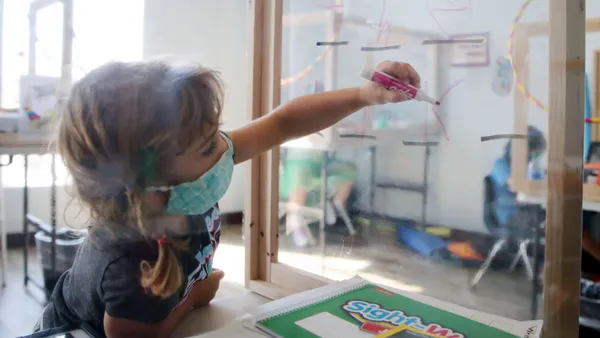Dive Brief:
- Top U.S. Department of Education officials on Tuesday continued to slam a Republican spending proposal spearheaded by House Speaker Kevin McCarthy that would raise the federal debt ceiling but impose deep budget cuts on the agency.
- Education Secretary Miguel Cardona, who has already publicly criticized the GOP debt ceiling plan, said in a phone call with reporters Tuesday that McCarthy is showing “staggering recklessness” with his approach. Cardona said the plan, which would make cuts to Title I and Individuals with Disabilities Education Act funding, would hurt the most vulnerable students.
- President Joe Biden has already rejected the GOP blueprint and said the White House will not negotiate over it. The plan is not expected to gain traction in the Democrat-controlled Senate.
Dive Insight:
Republicans are setting up a battle over the debt ceiling in an attempt to reign in federal spending. Pundits also say it's meant in part to force the president to come back to the negotiating table before the 2024 presidential election.
The proposal would lift the debt ceiling by $1.5 trillion or suspend it until March 2024, whichever comes first. The current national debt ceiling sits at $31.4 trillion — it was last raised in 2021.
The Republican plan doesn’t contain precise budget cuts, but would reduce discretionary spending to fiscal 2022 levels. The Biden administration has said the scheme would slash funding by 22% across the board, but since it wouldn’t touch defense spending, it would mean significant reductions for other federal agencies.
Notably, a reversion to fiscal year 2022 levels would reduce Title I grants to districts by $850 million, which would amount to a reduction of 13,000 teachers and service providers from classrooms serving low-income children.
A $3.1 billion cut — amounting to 22% of current funding — to state grants for the Individuals with Disabilities Act would mean about 48,000 fewer special educators. It would also mark a reversion of IDEA funding to its lowest since 1997.
About 26 million children from low-income communities would also see their schools’ funding level drop to its lowest point in a decade, said Cardona during a press call Tuesday.
“These schools were hard hit by the pandemic,” said Cardona. “And they’ll be hard-hit by the Republican budget if Kevin McCarthy gets his way ... it would be taking us backwards.”
Further, the cuts could mean backtracking on recent improvements to mental health supports in schools, which have been bolstered by pandemic-era federal funding.
A senior Education Department official said during Tuesday’s call that the degree of the cuts would devastate public schools across the nation and dig deep into foundational streams of funding, many of which have received periodic increases over the past few years.
Fiscal year 2023, for example, saw a 5.6% increase in overall K-12 federal funding, including a $850 million increase in Title I and an increase in $934 million for special education.
House Republicans say many of the overall increases in spending under President Joe Biden are “unsustainable” and amount to “out-of-control government spending.”
The topic of whether later rounds of federal pandemic aid were necessary for schools to reopen and recover from COVID-19 closures has also been raised by House Republicans, most recently in the unveiling of the party’s debt ceiling proposal.

















